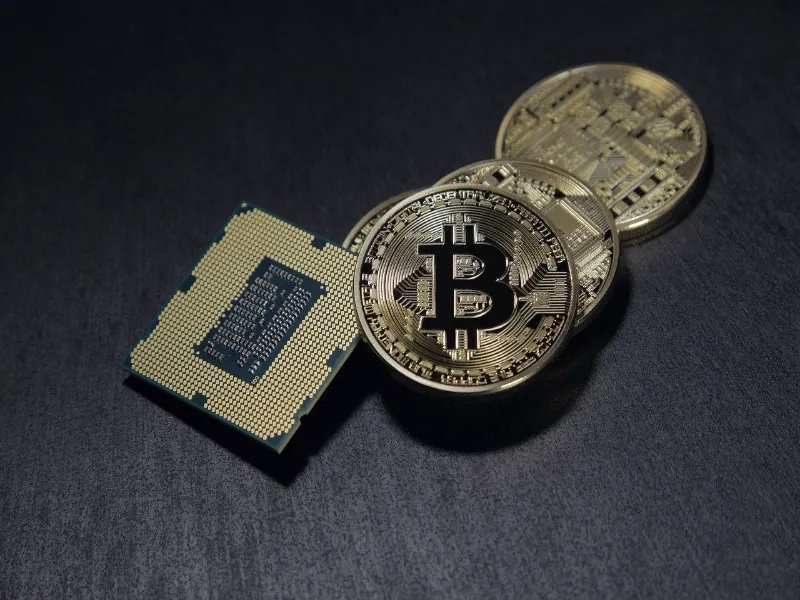- Bitcoin is a decentralized digital currency that operates without a central authority, using blockchain technology for secure transactions.
- Bitcoin’s role in the global economy is growing, with applications ranging from digital payments to decentralized finance (DeFi) and investment.
Bitcoin, often referred to as digital gold, is a decentralized digital currency that has revolutionized the world of finance since its inception in 2008. Developed by the anonymous figure known as Satoshi Nakamoto, Bitcoin operates on a peer-to-peer network that eliminates the need for intermediaries such as banks or governments. Through its secure and transparent blockchain technology, Bitcoin allows individuals to send and receive payments globally, without the need for centralized authority or traditional financial systems.
In the years since its introduction, Bitcoin has grown from a niche online curiosity into a global financial asset. Investors, institutions, and even governments are now increasingly exploring its potential. But what makes Bitcoin so special, and how does it work? In this article, we will delve into the fundamentals of Bitcoin, its technology, and the broader implications of its rise.
Also read: Bitcoin reaches record high as investors bet on Trump victory
Also read: MicroStrategy’s bold bet: More Bitcoin coming soon?
What is Bitcoin?
At its core, Bitcoin is a form of cryptocurrency, which refers to digital or virtual currencies that use cryptography for securing transactions, controlling the creation of new units, and verifying the transfer of assets. Bitcoin operates without a central authority, such as a government or central bank, making it different from traditional currencies like the dollar, euro, or yen. This decentralization is facilitated by blockchain technology—a public, distributed ledger where all Bitcoin transactions are securely recorded.
Unlike traditional financial systems, which are managed by central institutions, Bitcoin relies on a network of nodes that validate and verify transactions. These nodes are distributed across the globe, and together they form a robust system that ensures the accuracy and integrity of all Bitcoin transfers. By using cryptographic techniques, Bitcoin’s decentralized network prevents fraud and double-spending, giving users confidence in the validity of transactions.
The absence of a central authority also means that Bitcoin is immune to the influence of traditional economic policies such as inflation or monetary debasement. As a result, Bitcoin is seen by many as a hedge against inflation, a store of value, and a decentralized alternative to conventional banking and financial systems. This resistance to censorship and manipulation has made Bitcoin increasingly attractive to investors, especially in times of financial instability.

How does Bitcoin work?
Bitcoin operates on a peer-to-peer network, where transactions are made directly between users without the need for a middleman. These transactions are validated by network participants known as miners, who use computational power to solve complex cryptographic puzzles. When a miner successfully solves the puzzle, the transaction is added to the blockchain and verified by other miners.
The blockchain is a distributed ledger that records all Bitcoin transactions. It is maintained by a network of nodes (computers), each holding a copy of the entire blockchain. Because the blockchain is public and immutable, once a transaction is added, it cannot be altered or erased. This ensures transparency and security for Bitcoin users.
Also read: Core DAO highlights bitcoin DeFi at Bitcoin MENA
Bitcoin is a technological tour de force.
Bill Gates, Co-founder of Microsoft
The Bitcoin mining process
Bitcoin mining is the process by which new bitcoins are introduced into circulation and transactions are verified on the blockchain. It involves solving cryptographic puzzles using powerful computers that require significant computational resources. As miners work to solve these puzzles, they compete to be the first to find the correct solution and add the next block of transactions to the blockchain.
Miners are rewarded with newly created bitcoins for their efforts, as well as transaction fees paid by users who send Bitcoin transactions. The mining process serves two important purposes: securing the network and validating transactions, while also ensuring a steady issuance of new bitcoins.
The mining reward is halved approximately every four years in an event known as the “halving.” This reduces the rate at which new bitcoins are created and ensures that the total supply of Bitcoin will never exceed 21 million coins.

The benefits of Bitcoin
Bitcoin offers a range of benefits that make it an attractive option for individuals and businesses alike. Some of the key advantages include:
- Decentralization: Bitcoin operates without a central authority, meaning it is resistant to censorship and manipulation by governments or financial institutions.
- Global Accessibility: Bitcoin can be accessed and used by anyone with an internet connection, regardless of location. This makes it especially valuable in regions where access to traditional banking services is limited.
- Lower Transaction Costs: Bitcoin transactions typically have lower fees than traditional financial transactions, especially for cross-border payments, which can be expensive and slow through traditional banking systems.
- Security: Bitcoin uses cryptographic techniques to secure transactions and protect user privacy. The decentralized nature of the blockchain makes it difficult for attackers to alter transaction data.
- Transparency and Immutability: Bitcoin’s blockchain is public and transparent, allowing anyone to verify transactions. Once a transaction is added to the blockchain, it is immutable and cannot be changed.
Also read: Amazon shareholders urge bold Bitcoin treasury proposal
Also read: Bitcoin soars past $100,000 as Trump 2.0 stirs crypto euphoria

Bitcoin’s role in the global economy
Bitcoin has swiftly gained recognition as both a store of value and a means of exchange, attracting a wide range of investors, from individual users to large institutions. Its decentralized nature and resistance to inflation have made it an appealing asset for those seeking an alternative to traditional financial systems. Over the past few years, Bitcoin has increasingly been viewed as a hedge against inflation, especially in an era of unprecedented monetary expansion by central banks.
Institutional investors, including hedge funds and publicly traded companies, have begun to embrace Bitcoin not only as a speculative asset but also as part of their investment portfolios. Notable companies such as Tesla, MicroStrategy, and Square have added Bitcoin to their balance sheets, signaling growing corporate adoption. Furthermore, the introduction of Bitcoin ETFs (Exchange-Traded Funds) has provided traditional investors with a regulated and convenient way to gain exposure to Bitcoin without directly owning the cryptocurrency.
In countries facing economic instability or high inflation, Bitcoin has become a popular store of value. For example, in Venezuela and Argentina, where hyperinflation has devalued national currencies, Bitcoin offers individuals a means to preserve wealth outside of the control of local governments. As Bitcoin’s adoption continues to grow, it is increasingly viewed as a global asset, providing an alternative to traditional fiat currencies.

The challenges and risks of Bitcoin
While Bitcoin offers many advantages, it is not without its challenges and risks. Some of the most notable concerns include:
- Price Volatility: Bitcoin’s price can fluctuate significantly over short periods, making it a risky investment for those who are not prepared for sudden drops in value. This volatility has been one of the key criticisms of Bitcoin as a store of value.
- Regulatory Uncertainty: Governments around the world have struggled to develop clear regulatory frameworks for cryptocurrencies. In some countries, Bitcoin is banned outright, while others are still working on how to regulate its use.
- Environmental Impact: Bitcoin mining requires substantial computational power, which in turn consumes a significant amount of electricity. Critics have raised concerns about the environmental impact of Bitcoin mining, particularly in regions where electricity is generated from fossil fuels.
- Security Threats: While Bitcoin’s blockchain is secure, exchanges and wallets where users store their coins are not immune to hacking. Several high-profile hacks have resulted in the theft of millions of dollars worth of Bitcoin.
Also read: BlackRock’s Mitchnick sees bitcoin as a ‘risk-off’ asset
Bitcoin is the most important invention in the history of the world since the internet.
Roger Ver, Bitcoin Advocate
Bitcoin and the future of digital payments
Bitcoin has already demonstrated its potential to disrupt traditional payment systems, but its long-term impact remains uncertain. As Bitcoin adoption grows, it may pave the way for a broader shift towards digital currencies and blockchain-based systems. Governments and central banks are exploring the creation of their own digital currencies, known as Central Bank Digital Currencies (CBDCs), which could compete with Bitcoin and other cryptocurrencies.
Despite this competition, Bitcoin remains the leading cryptocurrency by market capitalization and continues to enjoy strong support from its community of users, developers, and investors. The rise of Bitcoin and other cryptocurrencies has sparked a wave of innovation in the financial industry, leading to the development of new technologies, payment systems, and financial products.
As the world moves towards digitalization, Bitcoin is likely to play an increasingly important role in the future of digital payments and the broader global economy.
Also read: Marathon’s bold bet: The future of bitcoin mining
Also read: 5 of Will Clemente’s most interesting thoughts on bitcoin’s future

Why Bitcoin matters
Bitcoin has proven to be much more than a passing trend. As the first decentralized cryptocurrency, it has fundamentally changed the way we think about money, payments, and financial systems. Its rise to prominence has introduced new possibilities for financial inclusion, asset diversification, and cross-border transactions.
However, Bitcoin’s future is still uncertain, and it faces numerous challenges, including regulatory scrutiny, security concerns, and environmental issues. Despite these obstacles, Bitcoin continues to gain support from individual users, institutional investors, and governments worldwide.
As Bitcoin continues to evolve, it will likely play an increasingly central role in shaping the future of digital finance and global economic systems. For those interested in the world of cryptocurrencies, Bitcoin remains the most important and influential asset to watch.
FAQs: What is Bitcoin?
Bitcoin is a decentralized digital currency that operates on a peer-to-peer network. It is not controlled by any government or central authority, and transactions are verified by network nodes through cryptography. Bitcoin is often used for online transactions, investments, and as a store of value.
Bitcoin works by using blockchain technology to securely record transactions. The blockchain is a distributed ledger that records all transactions across a network of computers. Bitcoin transactions are validated by miners who solve complex mathematical problems, ensuring the integrity of the system.
Bitcoin was created as a decentralized alternative to traditional currency, designed to enable peer-to-peer transactions without the need for a third-party intermediary. It can be used for online payments, remittances, and as an investment asset.
Bitcoin’s legality varies by country. In some countries, Bitcoin is fully legal, while others have imposed restrictions or banned its use. It is important to check local regulations before using or investing in Bitcoin.
You can buy Bitcoin through cryptocurrency exchanges such as Coinbase, Binance, or Kraken. You will need to create an account, deposit funds (usually via a bank transfer or credit card), and then buy Bitcoin in exchange for your local currency.

